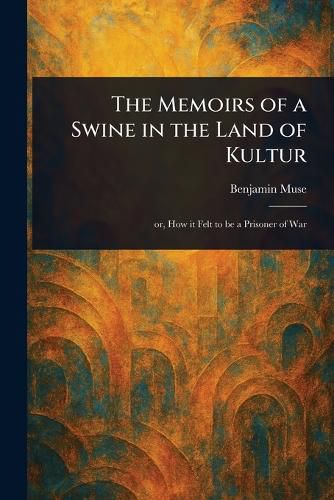Readings Newsletter
Become a Readings Member to make your shopping experience even easier.
Sign in or sign up for free!
You’re not far away from qualifying for FREE standard shipping within Australia
You’ve qualified for FREE standard shipping within Australia
The cart is loading…






This title is printed to order. This book may have been self-published. If so, we cannot guarantee the quality of the content. In the main most books will have gone through the editing process however some may not. We therefore suggest that you be aware of this before ordering this book. If in doubt check either the author or publisher’s details as we are unable to accept any returns unless they are faulty. Please contact us if you have any questions.
"The Memoirs of a Swine in the Land of Kultur, or, How it Felt to be a Prisoner of War" offers a rare and compelling personal narrative from the heart of World War I. Ben Muse recounts his experiences as a prisoner of war in German prison camps, providing a stark and unflinching look at the realities faced by captured soldiers.
This historical account sheds light on a crucial aspect of military history, detailing the daily life, struggles, and resilience of prisoners during the Great War. Muse's memoir vividly portrays the atmosphere within the camps and the psychological toll exacted by captivity.
A valuable contribution to the history of World War I and the study of prisoner-of-war experiences, this book provides unique insights into a tumultuous period in European history. A gripping testament to the human spirit amidst the harsh realities of war.
This work has been selected by scholars as being culturally important, and is part of the knowledge base of civilization as we know it.
This work is in the public domain in the United States of America, and possibly other nations. Within the United States, you may freely copy and distribute this work, as no entity (individual or corporate) has a copyright on the body of the work.
Scholars believe, and we concur, that this work is important enough to be preserved, reproduced, and made generally available to the public. We appreciate your support of the preservation process, and thank you for being an important part of keeping this knowledge alive and relevant.
$9.00 standard shipping within Australia
FREE standard shipping within Australia for orders over $100.00
Express & International shipping calculated at checkout
This title is printed to order. This book may have been self-published. If so, we cannot guarantee the quality of the content. In the main most books will have gone through the editing process however some may not. We therefore suggest that you be aware of this before ordering this book. If in doubt check either the author or publisher’s details as we are unable to accept any returns unless they are faulty. Please contact us if you have any questions.
"The Memoirs of a Swine in the Land of Kultur, or, How it Felt to be a Prisoner of War" offers a rare and compelling personal narrative from the heart of World War I. Ben Muse recounts his experiences as a prisoner of war in German prison camps, providing a stark and unflinching look at the realities faced by captured soldiers.
This historical account sheds light on a crucial aspect of military history, detailing the daily life, struggles, and resilience of prisoners during the Great War. Muse's memoir vividly portrays the atmosphere within the camps and the psychological toll exacted by captivity.
A valuable contribution to the history of World War I and the study of prisoner-of-war experiences, this book provides unique insights into a tumultuous period in European history. A gripping testament to the human spirit amidst the harsh realities of war.
This work has been selected by scholars as being culturally important, and is part of the knowledge base of civilization as we know it.
This work is in the public domain in the United States of America, and possibly other nations. Within the United States, you may freely copy and distribute this work, as no entity (individual or corporate) has a copyright on the body of the work.
Scholars believe, and we concur, that this work is important enough to be preserved, reproduced, and made generally available to the public. We appreciate your support of the preservation process, and thank you for being an important part of keeping this knowledge alive and relevant.